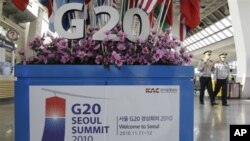Finance ministers and central bank governors from the 20 largest economies are gathering in South Korea as concerns grow about the possibility of a currency war.
Starting Friday, the economic policy makers of the top 20 economies will spend two days trying to reach agreements on the global financial system.
High stakes
Economics Professor Joshua Aizenman at the University of California-Santa Cruz says the meeting comes at a critical juncture.
"The stakes are too high to ignore the downside risk of a resumption of either more aggressive currency wars or maybe some steps that may lead then to retaliation and the beginning of trade wars," Aizenman said.
The world's three-largest economies - the United States, China and Japan - are entwined in terms of trade and investment. But economists say the relationship is out of balance. In part, the reason is that China's currency is significantly undervalued. That gives Chinese exporters, their competitors say, an unfair advantage.
To protect their own export industries, Brazil, Japan and Thailand have taken steps to slow the appreciation of their currencies. A number of other countries, including India and South Korea, are considering similar moves.
Is China to blame?
A U.S. Treasury Department senior official, without naming China, contends a large economy keeping its currency from rising "compels other countries to do the same" sparking what he terms "competitive non-appreciation."
China says America's economic problems are caused by Washington's policies and not the Chinese currency.
Professor Aizenman, the vice president of the Asia-Pacific Economic Association, says that in a globalized economy there is no way each of the G20 participants can push its own agenda without cooperation.
"So the key will be to find the proper compromise of each party without sacrificing the main agenda of each party," he noted, "but recognizing that trying to push a narrow agenda too aggressively will penalize everybody."
Compromise essential
Research fellow Kwak Soojong at the Samsung Economic Research Institute in Seoul says both Washington and Beijing appear ready for compromise. He notes China's surprise interest rate hike this week as one sign of flexibility.
"Therefore I believe there is no reason that these two big countries do not agree upon the serious matters that the rest of the 18 member countries are looking upon," Kwak said. "I am kind of a positive man and I wish those two big countries will agree upon the currency issues."
The meetings here are a prelude to the G20 leaders' summit in Seoul next month.
Finance Ministers, Bank Governors Meet to Avert Currency War
- By Steve Herman
